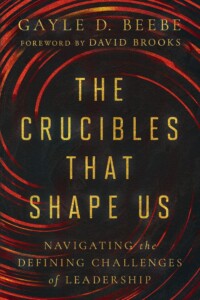
The Crucibles That Shape Us: Navigating the Defining Challenges of Leadership
With God are wisdom and strength, he has counsel and understanding.”
—Job 12:13
| I |
greatly appreciate Paul Yost’s poignant and generous review of The Crucibles that Shape Us.1 He accurately amplifies what I hoped to identify and communicate while noting key areas that would benefit from further attention. I especially welcome his engagement with the key themes and guiding priorities that form the essence of the book. What, then, do I hope readers will gain from it? A brief consideration of what captivated me in writing the book will provide an initial answer.
I’m just finishing my 25th year as a college president. While frequently asked how I became a president, I’m seldom asked why I pursued this goal. I initially thought I’d devote my life to pastoral leadership in the local church. Following my undergraduate degree (at George Fox with a consortium experience at Westmont during my senior year), I completed a Master of Divinity at Princeton Theological Seminary and began pastoring my own congregation in 1985 in a bedroom community near Portland, Oregon. I was conscientious about the work and loved what I was learning. But after attending one of the best seminaries in the world, I quickly realized I’d never been required to take a single class in leading and managing the local church. Yet I found myself spending at least 50 percent of my time in these areas that overlap directly with every other business or organization. As I pursued effective leadership in the local church, I also began to think about doing more formal education.
In 1990, my wife Pam and I decided to move to Southern California so I could pursue a dual degree at Claremont Graduate University, the graduate school of the five Claremont colleges. There I completed a PhD in philosophy of religion and an MBA in strategic management with Peter Drucker. The arduous course work required two doctoral seminars and two MBA classes every semester for four years, including language requirements in German and French during the summer, five qualifying exams at the end of the doctoral course work plus a book-length dissertation based on original research. It took me seven years to complete both degrees. However, I’m forever grateful I completed the dual degree.
These programs gave me a structure of meaning and understanding that guided my early work in higher education, first as a department chair and dean at Azusa Pacific University and eventually as a president, first at Spring Arbor University in Michigan and now at Westmont College in California, where I’m in my 18th year. You can see my earlier book, The Shaping of an Effective Leader, for my philosophy of leadership.2 Crucibles, my second book on leadership, articulates my significant experience-based learning during my 25 years as a president.
An accumulation of crucible experiences and our successful navigation of most, if not all, inspired me to write the book. This work reflects a combination of my preparation and reflection on leadership with my powerful testing by real-world experience.
I appreciate Yost’s review because he recognizes the complexity of leadership and its indefinite nature that persists most of the time. We’re often faced with making “directionally correct” decisions without being certain. Considering each crucible briefly helps illustrate the multi-dimensional insight that effective leadership requires.
The Crucible of Missed Meaning invites us to take a humble approach to what we know, recognizing that we often have experiences but miss the meaning. Why? Mostly because we exaggerate our capacities to understand situations without realizing our limitations.
The Crucible of Enduring Challenge speaks to the necessity of persevering. All the characters featured in this chapter led effectively largely because they refused to give up despite difficult and even harrowing circumstances. I summarized what I learned from my own perseverance in the list of 12 enduring lessons that open the chapter.3
The Crucible of Human Treachery focuses on the difference between saboteurs, charlatans, and the Judas syndrome. This chapter has drawn widespread interest and scrutiny as it deals with the universal reality of betrayal. Sometimes people just resent the gifts God has given someone else. At other times, they’re determined to destroy the gifts and contributions of others. In either case, these individuals pose a real threat to an organization and should be dealt with directly.
The Crucible of Awakened Moral Conscience concerns our own spiritual and intellectual pilgrimage and the way we embrace lifelong growth and development.
The Crucible of Social Conflict recognizes that, despite our best efforts, real social change always takes longer than we think it will. Here, as in earlier crucibles, we recognize the necessity of persisting to engineer and then embed real and substantive social change.
The Crucible of Human Suffering has also generated extensive interest and challenge. The universal experience of suffering, like that of betrayal, presents us with an almost endless supply of human examples. In our own lives, we experience suffering at the hands of nature, at the hands of disease, and at the hands of other humans. In every case, the response we make to suffering determines whether it destroys us or strengthens us.
Finally, the Crucible of Personal Choice forces us to admit that many of our challenges in life often result from choices we made or didn’t make. We’re usually a lot more responsible for our circumstances in life than we care to recognize or admit.
Briefly summarizing the seven crucibles illustrates the poignancy of Yost’s observation, “Leadership isn’t a prize to be sought but a calling to be lived.”
Ultimately, Yost invites us both to find and create additional resources that can guide Christian leaders in all walks of life. I think this noble exhortation should be universally heeded. Christian framing is essential. Personal disciplines in conversation with the great disciplines of the church are a must. But ultimately, we must find a way to balance being faithful to our purpose in life and calling as we strive to satisfy the universal desire to make our life count. We all find our greatest meaning and fulfillment by the sense that we serve the purposes of God that will outlive us.
I conclude my thoughts with a brief reflection on the passage from Job that forms the epigraph headlining this response. Job features some of the most probing questions and puzzling answers in Scripture. Throughout the book, his three friends raise the theological questions that plague every person who has thought seriously about their life on Earth and their responsibilities before God. We’re often tempted to ask, “Why do good things happen to bad people?” when so many other passages reflect our more normative belief that good things come to those who wait upon the Lord.
Although Job agrees that things should work this way, his own experience leads him to argue that God doesn’t always act accordingly. As the book continues, we realize that even in his probing and prodding, Job misses the wider understanding: that the rain falls on the just and the unjust, and our greater meaning in life comes from finding God not only through his faithfulness to us but also in the posture we take to God throughout our life.
Recently, we’ve received the first tranche of results from the Global Flourishing Study. This large-scale, longitudinal research study is aimed at understanding what factors contribute to human flourishing. It consists of a global panel of more than 200,000 participants from 22 countries drawn from an annual data collection for five years. The study examines flourishing in six domains:
- Happiness and life satisfaction
- Meaning and purpose
- Character and virtue
- Close social relationships
- Financial and material stability
- Mental and physical health
The flourishing score for those who identify as spiritual and religious is statistically higher on average than those who identify as neither spiritual nor religious. Additionally, it’s higher for those who say religion is an important part of their daily life.
Ultimately, what Job suggests and this study indicates is that anchoring our life to God may not change the circumstances of our life, but it will alter our outlook and ability to deal with them. And this makes all the difference.
Consider this example from my own experience. When I was 22 years old and graduating from college, nothing really tragic had happened in my life. I experienced the normal setbacks, disappointments, and failures, but all within the normal bandwidth that seemed manageable and predictable. Nobody in my immediate family had died suddenly or unexpectedly. Nobody had been struck with cancer or other life-threatening diseases. Nobody had gone through a divorce or other personal challenges. But by the time I was 30, all that had changed. In those eight short years, the realities of the world crashed in on me.
And yet, as I look back on that time, I found great opportunities during those challenges. I settled on my purpose in life. I chose my partner, and Pam and I have been married for 37 years. During this time, we’ve discovered the true joy of knowing we’re serving purposes that honor God.
I hope that the challenges ahead of us won’t destroy us. Instead, I pray that these crucibles will direct us to the purposes God has prepared and equipped us to confront, a purpose found and elevated in Paul Yost’s helpful review.
Cite this article
Footnotes
- Gayle D. Beebe, The Crucibles that Shape Us: Navigating the Defining Challenges of Leadership (InterVarsity, 2024).
- Gayle D. Beebe, The Shaping of an Effective Leader (InterVarsity, 2011).
- 1. Enjoy today, tomorrow has enough worries of its own; 2. Never open a two-front war if you can help it; 3. Don’t overreact to overreactions; 4. Don’t say everything you think (I’ve never gotten in trouble for things I thought but didn’t say); 5. Stay emotionally present even when you don’t feel like it; 6. I’ve never had an opportunity expand without a potential problem expanding with it; 7. Be disciplined with what you share and with whom you share it; 8. Avoid no-win arguments; it’s like wrestling with a pig—you both get dirty and the pig loves it; 9. Cultivate a results-oriented mindset with attention to doing the right activities; 10. Cultivate an aspiring edge that stimulates hope and renewal; 11.Maintain a commitment to open communication and conflict resolution; 12. Always work to outlast the opposition except when you know it’s the right time to leave for the right reason. See Beebe, The Crucibles that Shape Us, 28.






















